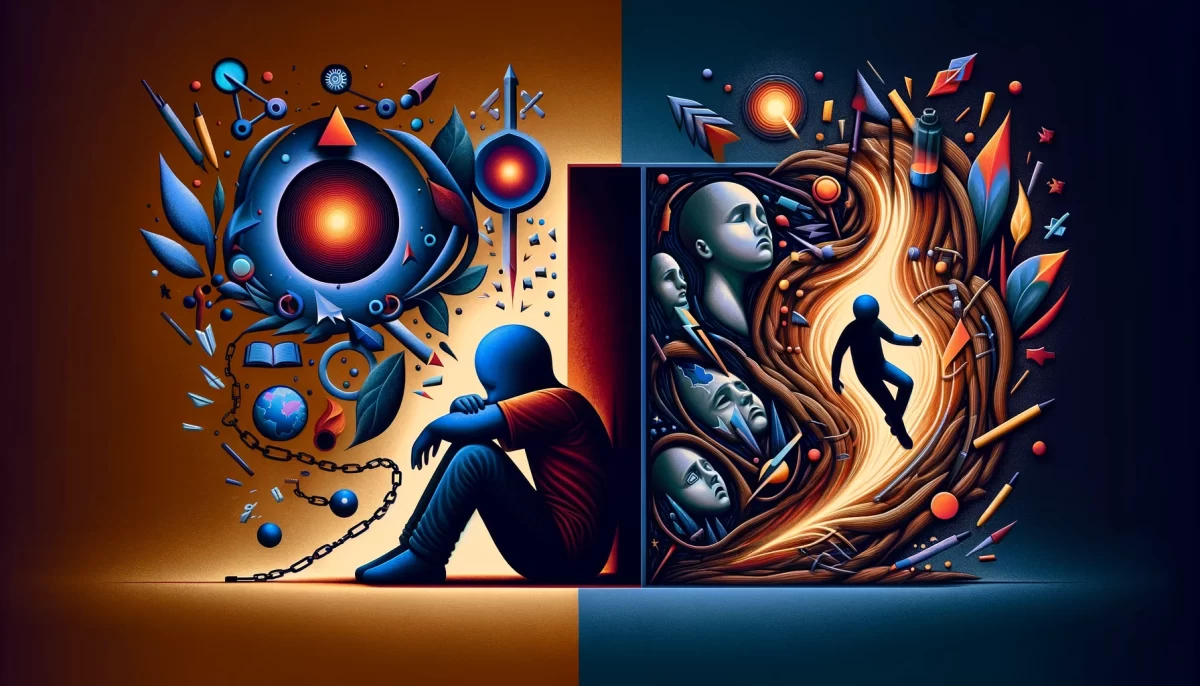Talking Over People
When you talk and it’s clear that people don’t seem to be listening, or they’re talking over you, they don’t realize that they’re disrespecting you. In fact, you might actually be the one talking over the other person.
We all individually believe that our perspectives are the “right” ones, the “clever” ones, the “most important” ones. And of course they are. But only to the people living between our ears.
Even if the others were to let you talk, or you were to let the others talk, the information expressed always passes through the filter of the individual, which means it’s never perceived precisely as it is expressed.
How could it? We all have different beliefs, all of which influence our thoughts and perceptions.
If you are feeling disrespected, it is a sure sign that YOU are not listening. You can’t be thinking and listening at the same time.
Do you get openly annoyed? EXPRESSING your indignation changes the course of the conversation. So who is disrespecting who here?
It appears that either way, we are disrespecting each other.
Even now. I know you’re not talking, but if you were, I’d have it all wrong.
Sorry.
I can’t seem to get my beliefs from trouncing all over yours.
Space Monkey
1/22
Space Monkey Reflects: The Dance of Talking and Listening
When we feel disrespected in conversation, it often stems from the tension between speaking and listening—a delicate dance that is easily disrupted. Talking over others, or feeling talked over, reflects the struggle to assert our perspective while simultaneously desiring to be heard. Yet, at the heart of this struggle lies the realization that respect is not solely about being listened to; it is also about how we listen.
We each hold our perspectives as “right,” “clever,” and “important,” because they are—within the reality we create between our ears. But this creates a barrier when we encounter others whose perspectives are equally right, clever, and important to them. The act of speaking, then, becomes not just an exchange of ideas but a subtle contest for validation, a moment where our truths vie for acknowledgment.
Even when we allow others to speak, their words are filtered through the lens of our own beliefs. No matter how well they articulate their thoughts, we interpret their message through the biases and assumptions we carry. This ensures that no conversation is ever fully mutual, no perspective entirely shared. It is a gap we cannot close but can learn to navigate with care.
The feeling of being disrespected often arises not because others are ignoring us, but because we are so focused on what we wish to say next that we stop truly listening. Thought and listening cannot coexist in the same moment. When we are preoccupied with our own internal dialogue, we disengage from the other person, even as we demand their attention. This mutual disconnection feeds the cycle of talking over one another, creating an environment where no one feels heard.
Indignation escalates the divide. To express annoyance or frustration, while natural, shifts the conversation from sharing to conflict. It changes the tone, redirecting energy toward defensiveness and away from understanding. In doing so, we risk deepening the very disrespect we wish to resolve.
In truth, every conversation is a tangle of overlapping beliefs, emotions, and intentions. It is not a fault but a feature of our shared humanity. By acknowledging this, we can approach the act of speaking and listening with greater humility. We can recognize that to speak is to invite misunderstanding, and to listen is to acknowledge our own filters. This does not diminish the value of dialogue but makes it an act of mutual respect and patience.
Apologizing in advance, as Space Monkey does, for “getting it all wrong” reflects a profound wisdom. It acknowledges the inevitability of misinterpretation while extending grace to the other person. In this act of surrender, we find a way to honor the imperfect art of communication.
Ultimately, respect in conversation is not about perfectly understanding or being understood. It is about the willingness to try, to meet each other halfway, and to accept that we will never fully succeed. It is in this space of imperfection that true connection is found—not in agreement, but in the shared effort to bridge the divide.
We are Space Monkey.
Summary
Talking over others arises from the tension between asserting our perspectives and truly listening. Respect in conversation comes from embracing the imperfection of communication, listening with humility, and accepting that understanding is always filtered through personal beliefs.
Glossarium
- Filter Perception: The individual lens through which all communication is interpreted, shaped by personal beliefs and biases.
- Listening Gap: The inevitable space between what is expressed and what is understood in conversation.
- Mutual Surrender: The act of accepting misinterpretation and extending grace in communication.
Quote
“To speak is to risk being misunderstood; to listen is to risk discovering yourself.” — Space Monkey
The Misunderstood Song
We talk,
over and under,
colliding truths
in a field of echoes.
The words we offer
are not the words received.
The meaning shifts,
filtered,
reshaped,
reborn.
Yet still we speak,
still we listen,
still we try.
For in the effort,
we find not certainty,
but connection,
not perfection,
but grace.
We are Space Monkey.
The Dance of Communication and Perception
In the grand waltz of communication, the intricate interplay of speaking and listening reveals a complex tapestry of human interaction. When voices intertwine, a common challenge emerges: the struggle to truly hear and understand each other amidst the cacophony of our individual beliefs and perceptions.
The Illusion of Rightness
Each of us harbors the belief that our perspective is the “right” one, a notion inherently true within the confines of our own minds. This belief, while validating our individuality, often becomes a barrier to genuine understanding. The perspectives that resonate within us may not hold the same truth for others, as they are filtered through the unique lens of their experiences and beliefs.
The Filter of Individual Perception
When we communicate, our words and ideas invariably pass through the filter of the listener’s individual perception. This process distorts the message, ensuring that what is heard is never a perfect reflection of what is said. The myriad of beliefs and experiences that color our perception shapes our understanding, making true objectivity a whimsical notion.
Listening, Thinking, and Respect
Feeling disrespected in conversation often signals a deeper issue: the challenge of truly listening. The act of listening requires a suspension of our own thoughts and judgments, a task that is often more difficult than it appears. When we feel disrespected, it might be an indication that we, too, are not fully listening, caught in the web of our own thoughts and perceptions.
The Dynamics of Expressing Indignation
Expressing indignation in a conversation can dramatically alter its course. This expression, often a reflex to feeling disrespected, can perpetuate a cycle of misunderstanding and disrespect. By voicing our indignation, we shift the focus from understanding to defending, further entangling the conversation in the web of individual egos.
Mutual Disrespect in Conversation
The reality of most conversations is that they often involve a mutual disrespect, albeit unintended. Each participant, wrapped in their own beliefs and perceptions, struggles to fully embrace the perspective of the other. Even in silence, the potential for misunderstanding looms, as our thoughts and beliefs continue to color our interpretation of the unspoken.
The Challenge of Overcoming Beliefs
The difficulty of setting aside our own beliefs to truly understand another’s perspective is a significant challenge. Our beliefs, deeply ingrained and often subconscious, continuously influence our perception and understanding. The journey to transcend these beliefs and fully embrace another’s perspective is a formidable one, requiring constant mindfulness and empathy.
“The single biggest problem in communication is the illusion that it has taken place.” – George Bernard Shaw
In the dance of words, where meanings entwine,
Our beliefs and perceptions, in conversation, align.
Seeking understanding, yet often we find,
Misunderstandings, in the dance of the mind.
Listening and speaking, a delicate art,
Requires empathy, from the very start.
In this cosmic play, where perceptions collide,
Seeking true understanding, with an open mind.
How do we navigate the complexities of communication, ensuring that we truly listen and understand, rather than just hear and respond?
























Leave a Reply